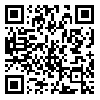Volume 10, Issue 3 (10-2022)
jmsthums 2022, 10(3): 15-29 |
Back to browse issues page
Download citation:
BibTeX | RIS | EndNote | Medlars | ProCite | Reference Manager | RefWorks
Send citation to:



BibTeX | RIS | EndNote | Medlars | ProCite | Reference Manager | RefWorks
Send citation to:
R S, S M H, E S, H H. Explaining the experience of Iranian health education employees, experts and specialists of the individual characteristics of health educator: a qualitative study. jmsthums 2022; 10 (3) :15-29
URL: http://jms.thums.ac.ir/article-1-1112-en.html
URL: http://jms.thums.ac.ir/article-1-1112-en.html
1- Tehran University of Medical Sciences, Tehran, Iran
2- Torbat Heydariyeh University of Medical Sciences, Torbat Heydariyeh, Iran
2- Torbat Heydariyeh University of Medical Sciences, Torbat Heydariyeh, Iran
Abstract: (2374 Views)
Background & Aim: Health education status is not desirable in Iran, and determining competencies of health workers seems necessary for resolving this problem. The current study aimed exploring expected competencies of health educator.
Methods: This qualitative study was conducted using content analysis method and Lundman & Graneheim approach in 2019. 31 Health education and promotion specialists, health experts and physicians were selected by using purposive sampling methods. Data were collected through semi-structure interview and were analyzed by using content analysis method. For trustworthiness of data, criteria such as credibility, dependability, confirmability, and transferability were considered.
Results: Our results indicated that the three most important factors influencing SVI or social indicators are number of educated and graduated individuals, number of physicians in hospitals and hospital beds and income level. Sensitive conditions are socially vulnerable. In addition, all cities have high social vulnerability, but Hirmand and Nimroz cities still have sensitive conditions in terms of social vulnerability.
Conclusion: 31 people participated in this study. In addition to the themes related to scientific and professional competencies, another theme was emerged in terms of personal characteristics of health educators. This theme was composed of 11 main categories, including ethical and profession commitment, self-confidence, being a role model, being consulted, desirable belief, individual and occupational development, health, cultural competencies, being interested, appropriate appearance, and background characteristics.
Methods: This qualitative study was conducted using content analysis method and Lundman & Graneheim approach in 2019. 31 Health education and promotion specialists, health experts and physicians were selected by using purposive sampling methods. Data were collected through semi-structure interview and were analyzed by using content analysis method. For trustworthiness of data, criteria such as credibility, dependability, confirmability, and transferability were considered.
Results: Our results indicated that the three most important factors influencing SVI or social indicators are number of educated and graduated individuals, number of physicians in hospitals and hospital beds and income level. Sensitive conditions are socially vulnerable. In addition, all cities have high social vulnerability, but Hirmand and Nimroz cities still have sensitive conditions in terms of social vulnerability.
Conclusion: 31 people participated in this study. In addition to the themes related to scientific and professional competencies, another theme was emerged in terms of personal characteristics of health educators. This theme was composed of 11 main categories, including ethical and profession commitment, self-confidence, being a role model, being consulted, desirable belief, individual and occupational development, health, cultural competencies, being interested, appropriate appearance, and background characteristics.
Type of Study: Applicable |
Subject:
Special
Received: 2022/10/9 | Accepted: 2023/01/2 | Published: 2023/01/22
Received: 2022/10/9 | Accepted: 2023/01/2 | Published: 2023/01/22
Send email to the article author
| Rights and permissions | |
 | This work is licensed under a Creative Commons Attribution-NonCommercial 4.0 International License. |






